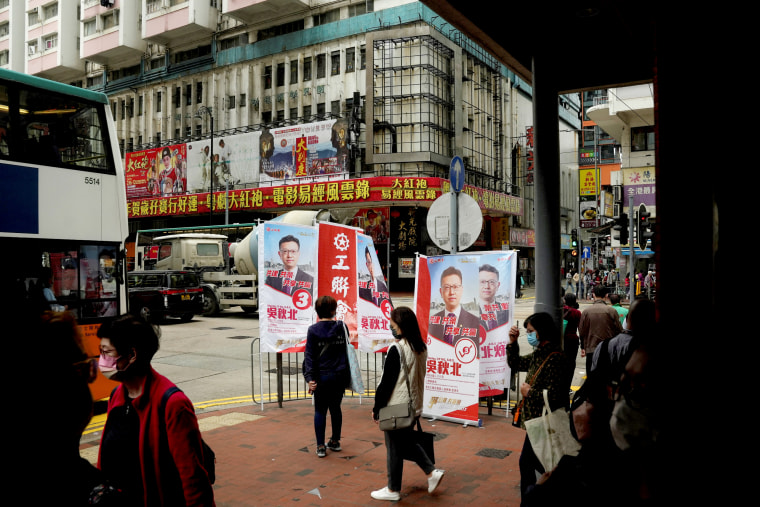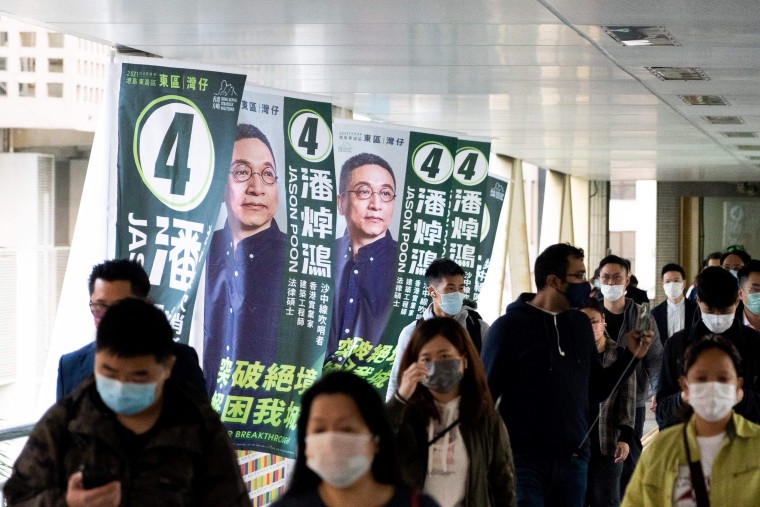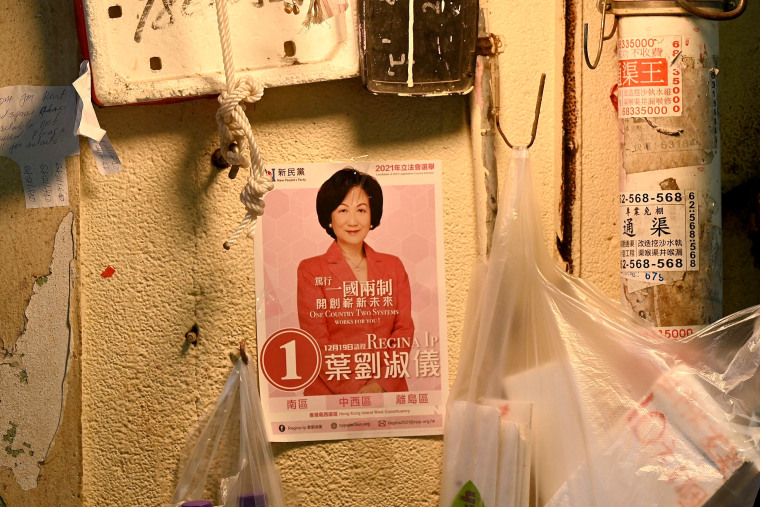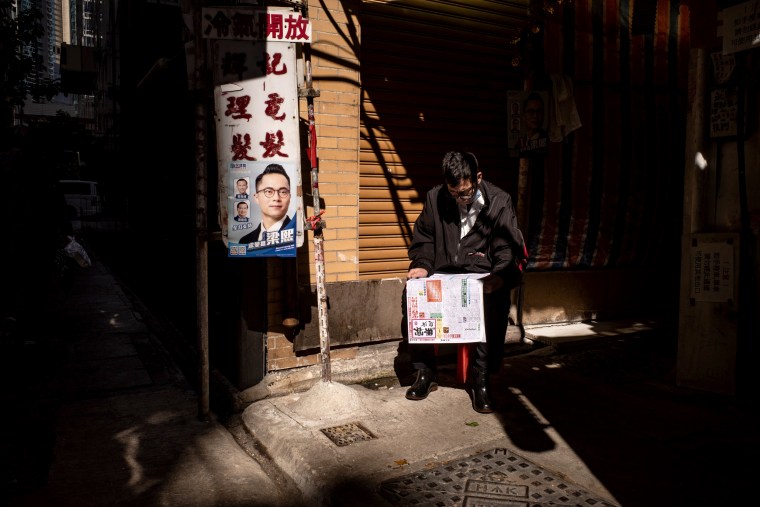The last time Hong Kong held an election, at the height of anti-government protests in 2019, pro-democracy candidates scored their biggest victory ever, winning control of 17 out of 18 district councils.
This time, as the Chinese territory holds an election for its legislature, no one from a pro-democracy party is even running.
The election Sunday is Hong Kong's first since a dramatic overhaul of its electoral system, which critics say is aimed at tightening Beijing's grip on the legislature, known as the Legislative Council, and further silencing opposition figures. Many of the territory's democratic politicians are in prison or awaiting trial; others have been barred from running, resigned from politics or gone into self-exile overseas after a crackdown on dissent that included a sweeping national security law Beijing imposed last year.
The drastic shift has tamped down public enthusiasm for the election, with fewer than half of voters saying they plan to participate, compared to a record 71 percent turnout in the district council election in 2019.

Critics of the government say the election is the capstone on a head-spinning demolition of the pro-democracy movement in Hong Kong, an international financial hub that was long a bastion of freedom in Asia. Once the votes are in, said Ted Hui, a former pro-democracy lawmaker, the legislature will be "a total rubber stamp, with no democratic elements at all."
Purge of democratic voices
Hong Kong, a former British colony, has never had full democracy. But when it returned to Chinese rule in 1997, it was promised a high level of autonomy and greater civil liberties than in the mainland.
In 2019, frustration with Hong Kong's democratic development and fear of encroachment by Beijing fueled months of sometimes violent protests, during which some activists called for Hong Kong to seek independence. The election in November 2019 was seen as a de facto referendum on the protests, and the pro-democracy camp's landslide victory was an embarrassment to Beijing and the ruling Communist Party.
Since then, democratic voices have been purged from every level of Hong Kong government. In November 2020, the entire democratic opposition in the Legislative Council resigned in protest after Hong Kong officials, newly empowered by Beijing, ousted four of their colleagues on "national security" grounds. About three-quarters of the almost 400 democrats on the district councils, which handle hyperlocal issues like garbage collection, have also been disqualified or driven to resign.
More than 150 people, including some of Hong Kong's most prominent democratic activists, have also been charged under the national security law.
The legislative election Sunday, originally scheduled for September 2020, was postponed for more than a year by the Hong Kong government, which cited the coronavirus pandemic. In the meantime, changes to the electoral law were passed this year to keep anyone China considers "unpatriotic" from political power.

The changes, which have been widely criticized internationally, including by the U.S., reduced the number of directly elected seats in the legislature and required candidates to be vetted by a pro-Beijing committee. Although they were initially divided over whether to participate in a political process they viewed as rigged, Hong Kong's pro-democracy parties ultimately fielded no candidates, effectively boycotting the vote.
Establishment support
Pro-establishment figures have supported the election overhaul, which they say will halt what they see as the "political chaos" of recent years and allow the Legislative Council to better address long-standing local issues, such as the high cost of housing.
Michael Tien, a pro-Beijing candidate, said there was still room for a range of political voices as long as they did not obstruct the work of the legislature.
"I don't mean those who are destructive and oppose for the sake of it, but those that can pressure the government," he said.
Despite intense campaigning and efforts to stress the presence of a "diversity" of candidates, many Hong Kongers are showing a lack of interest in the election.
Just 48 percent of registered voters say they will "definitely" or "probably" vote Sunday, according to survey results released Friday by the Hong Kong Public Opinion Research Institute. More than half of voters said there were no candidates worthy of their support.
Betty Wong, an office worker in her 20s, said she had no intention of voting, saying there were few appealing candidates in the "one-sided" election.
"The district election in 2019 offered seats to many pro-democracy politicians, but the government ended up disqualifying or revoking their seats," Wong said. "It's meaningless for candidates to run any campaigns this year."
Wong said she waited in a long line in 2019 to vote for the only pro-democracy candidate in her district, angered by the government's response to the protests.
"Even though Hong Kongers expressed their opinions peacefully, the government was indifferent and even used violence to suppress the unrest," she said. "The government didn't fulfill the requests of the society."
Hong Kong officials have tried to lower expectations ahead of the election, with Chief Executive Carrie Lam even suggesting that poor turnout could be a positive sign.
"When the government is doing well and its credibility is high, the voter turnout will decrease because the people do not have a strong demand to choose different lawmakers to supervise the government. Therefore, I think the turnout rate does not mean anything," she said in an interview this month with the Global Times, a state-backed nationalist tabloid in mainland China.
But the Hong Kong government appears to care deeply about criticism of the election's legitimacy, even from abroad. Last month, authorities issued arrest warrants for Hui and another former lawmaker, Yau Man-chun, both of whom have left Hong Kong, after they urged voters to boycott the election or cast blank ballots. Such calls are illegal under the new electoral law.
In recent days, there have been multiple arrests in Hong Kong over calls to cast blank ballots, including the arrests of some people accused of sharing one of Hui's social media posts. Arrest warrants were issued Saturday for five more overseas activists accused of encouraging an election boycott.
"Blank votes are direct, active resistance that shows the will of the people more clearly as it can be seen and counted," Hui said.
Download the NBC News app for breaking news and politics
The Hong Kong government may be trying to avoid a repeat of what happened this year in the neighboring territory of Macau, a former Portuguese colony that returned to Chinese rule in 1999. For the first time, all pro-democracy candidates were disqualified from running in the September legislative election, with officials citing, among other reasons, their insufficient loyalty to the Macau government.
The election had a record low turnout, which the government attributed to the pandemic, and a record number of blank votes.
Hui, who now lives in Australia, said he also expected historically low turnout in the Hong Kong election, which he said was "illegitimate."
"People feel that elections are irrelevant to them after the forced change of the electoral system," he said.
'Gloomy' atmosphere
While no candidates officially represent a pro-democracy party, a handful of hopefuls describe themselves as independents or advocates of democracy. But their attempts to chart a middle ground have only drawn criticism from both sides.
Adrian Lau, a district councilor and former public relations executive, is one of the most high-profile independent candidates. His pro-Beijing rivals accuse him of having suddenly discovered his love of country to participate in the "patriots-only" election, while democrats question whether he and other independent candidates are truly from the same camp of opposition activists who have largely been arrested and charged.

Hui said he interpreted "patriots" to mean those who would reliably fall in line with the government.
"I do not regard anyone running in the election as pro-democracy," he said. "I consider all of them Chinese Communist Party-approved people who are all pro-Beijing."
Lau, 45, denied that he had made any compromises to win approval from the vetting committee.
"They thought I could offer a different voice," he said.
Lau said he sees a difficult future for Hong Kong, as the vague nature of the national security law makes it hard to know where the red lines are drawn. But he said he still thought he had something to offer as a politician.
"I know the atmosphere is gloomy now, but I should still run," he said.
